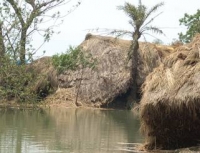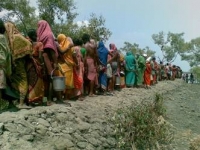Political
Water, Environment and Media, Makhanlal Chaturvedi University, Bhopal
Posted on 05 Jan, 2010 11:08 AMWater, Environment and Media
Organisers: Makhanlal Chaturvedi University of Journalism and Mass Communication and Hindi India Water Portal
Venue: Makhanlal Chaturvedi University, Bhopal, M.P.
Date: 14th January 2010 at 9:00-4:00 PM
Contact: Minakshi Arora - water.community@gmail.com
VIVIDH - VIDEO VOLUNTEERS NEW INITIATIVE ON COMMUNITY JOURNALISM
Posted on 31 Dec, 2009 10:12 AMImagine a journalist, activist or government official receiving a press release and a video in her inbox and it reads, “The practice of Untouchability in schools in India is a problem many people assume no longer happens. Well, last month, 60 community journalists investigated the issue in every state in India, and found troubling visual evidence of the practice across the country. These activist-journalists are rallying their communities to address this issue. Will you join them in speaking out? See the proof, realize the scale of the problem and take action!”
Clicking on the link leads you to a video gallery with 60 short videos, each from a different region/state, demonstrating the widespread nature of this issue and other problems. The main video provides a journalistic roundup of the overall problem. Other links lead viewers to take concrete action to combat the issue.
World water day concert, 22 March 2010, Kochi
Posted on 30 Dec, 2009 02:33 PMWorld water day concert, 22 MARCH 2010, Kochi, Kerala
Water consumption per employee in indian industry
Posted on 29 Dec, 2009 06:13 PMPls let us know the water consumption per day in indian industry...
Glacial Lake Outburst Flood (GLOF) - The Himalayan tsunami in a village in Nepal
Posted on 29 Dec, 2009 04:47 PMIt was an uncharacteristically sunny day for the monsoon, with blindingly clear skies. Namgye Chumbi was weeding his potato garden in Phakding by the Dudh Kosi on the morning of 4 August 1985.
There weren't too many trekkers on the trail. The Dudh Kosi was tumbling noisily over boulders nearby. Around two in the afternoon, the river went quiet. Namgye sensed danger.
"I noticed that the white water had turned muddy brown, and in the distance I heard a thundering sound like an approaching helicopter," recalls the 50-year-old farmer. "I looked upstream and saw this huge wall of dark brown water approaching very fast."
India NGO Awards 2009: Nominations invited
Posted on 29 Dec, 2009 11:42 AM
The Resource Alliance and the Rockefeller Foundation are pleased to invite applications for the India NGO Awards 2009. The Awards, as you may be aware were instituted in 2006 to recognise and felicitate those organisations that have demonstrated best practices in creative resourcing, financial management, governance and impact in the community.
Non Governmental Organisations from across the country are encouraged to send in their entries under one of the three categories based on their annual budget for 2008-09.
Categories
- Small: Annual budget under Rs 50 lakhs
- Medium: Annual budget between Rs 50 lakhs and Rs 5 crores
- Large: Annual budget over Rs 5 crores
Interim Report on organic farming initiatives in AILA affected areas
Posted on 28 Dec, 2009 06:19 PMCyclone Aila hit the coasts of Bengal on May 25th displacing millions from their homes and livelihoods in the Sundarbans. AID responded immediately working with Baikanthapur Tarun Sangh (BTS), Mukti and Rights & Equity for All (REFA). Relief & Rehab efforts reached out to 150,000 people in 7 blocks of 2 districts in West Bengal.


Workshop on pollution abatement in Ganga basin - Need for effective waste water management
Posted on 28 Dec, 2009 05:08 PMKanpur, November 24, 2009: Shri Alok Ranjan, IAS, Principal Secretary, UP Urban Development and Environment, inaugurated the workshop organized by WWF India, Kanpur Nagar Nigam and IIT Kanpur.
Overarching conclusions during World Water Week- Stockholm International Water Institute
Posted on 28 Dec, 2009 04:58 PMThis section is based on Stockholm International Water Institute’s conclusions and what we consider as the key threads that emerged from the week. These overarching conclusions are also based on the summary reports from workshops and seminars and the rapporteur theme reports (see next section of this publication). Our interpretation of issues raised from over 100 substantive sessions are intended to provide meaningful messages for both participants who were at the week and other stakeholders unable to attend. The overall aim is to maintain a dialogue beyond the intense and fruitful discussions during the World Water Week itself.
Access to water
Water scarcity, poverty in its multiple manifestations, conflicts and political circumstances influence people’s ability to access water, particularly for the daily requirements for drinking water and household needs. Water may be available in aquifers, in nearby streams or even in village ponds, but due to technical, economic, cultural and other reasons many people may not have access to water sources or to the services that are organised by the public sector or other providers. Not having access to the most basic necessity of life is causing dramatic and detrimental consequences for the people concerned. Detailed statistical accounts and a large number of illustrated cases of people affected from a lack of access to drinking and household water, are repeatedly presented in literature and media. It is, indeed, mindboggling that in spite of repeated high level commitments and the fact that there are few, if any, political disagreements, the efforts to substantially reduce the plight of the 1.1 billion who lack access to household water are not enough. It is essential to recognise that it is not only the 1.1 billion who are affected. Families and relatives of those who are affected, their farms or work places and society at large also bear the brunt of this lingering tragedy. For various reasons, there is less evidence of these wider costs to society.